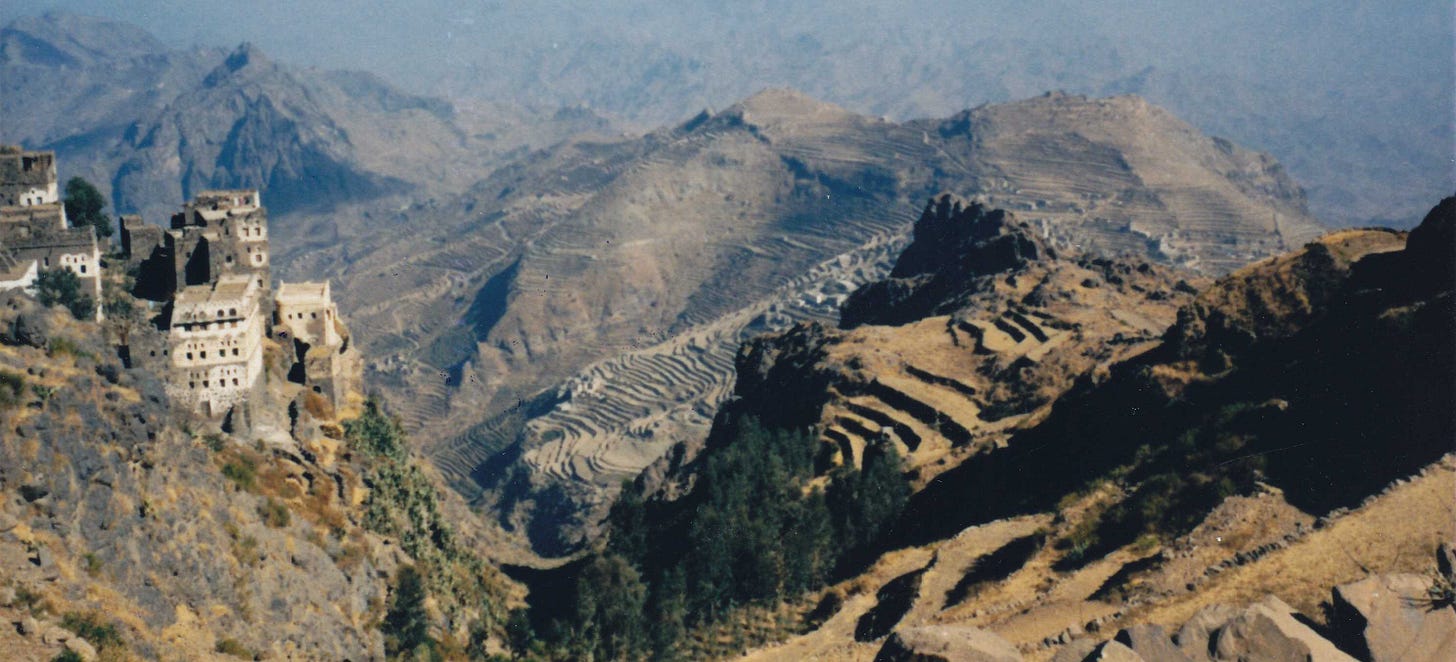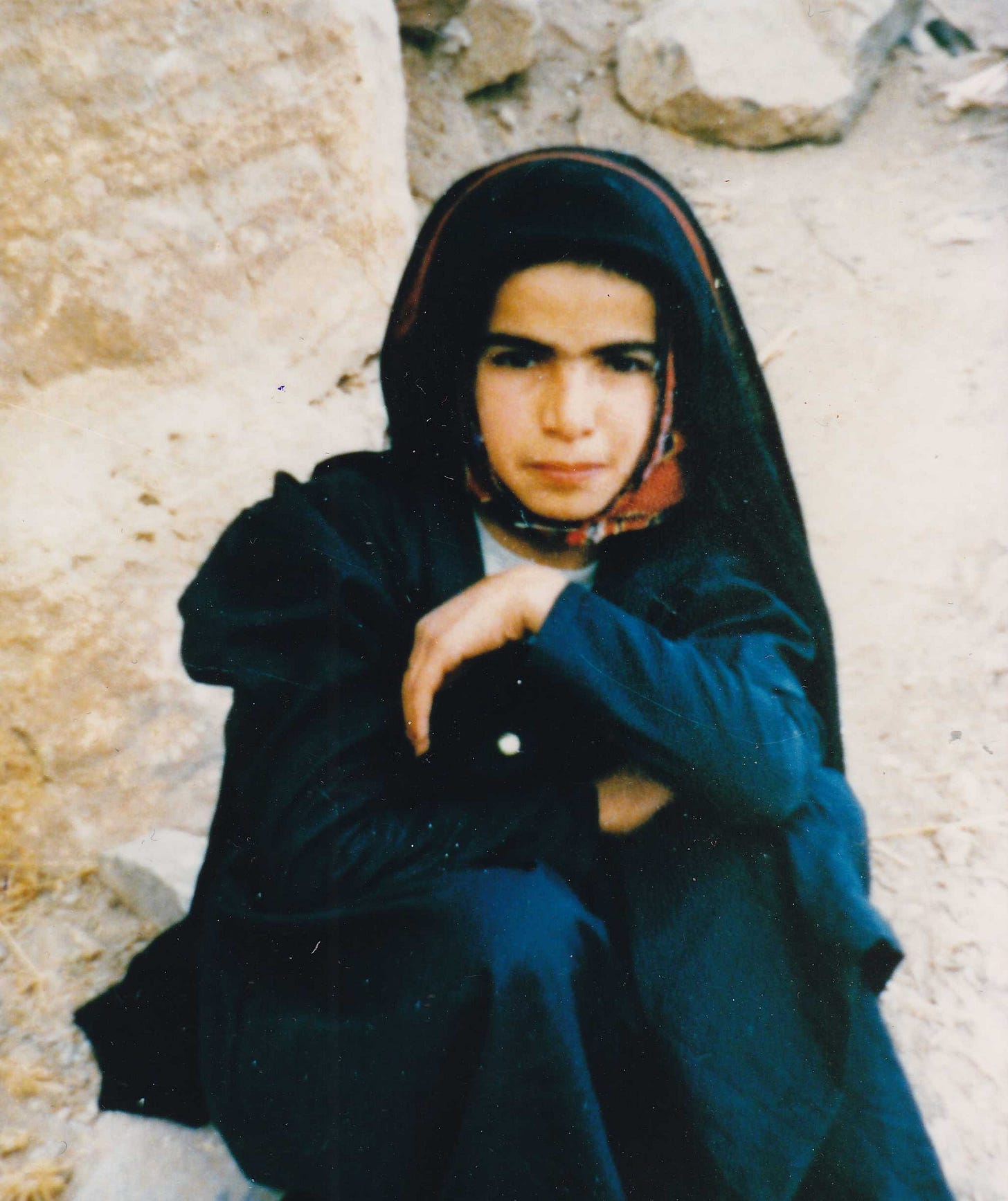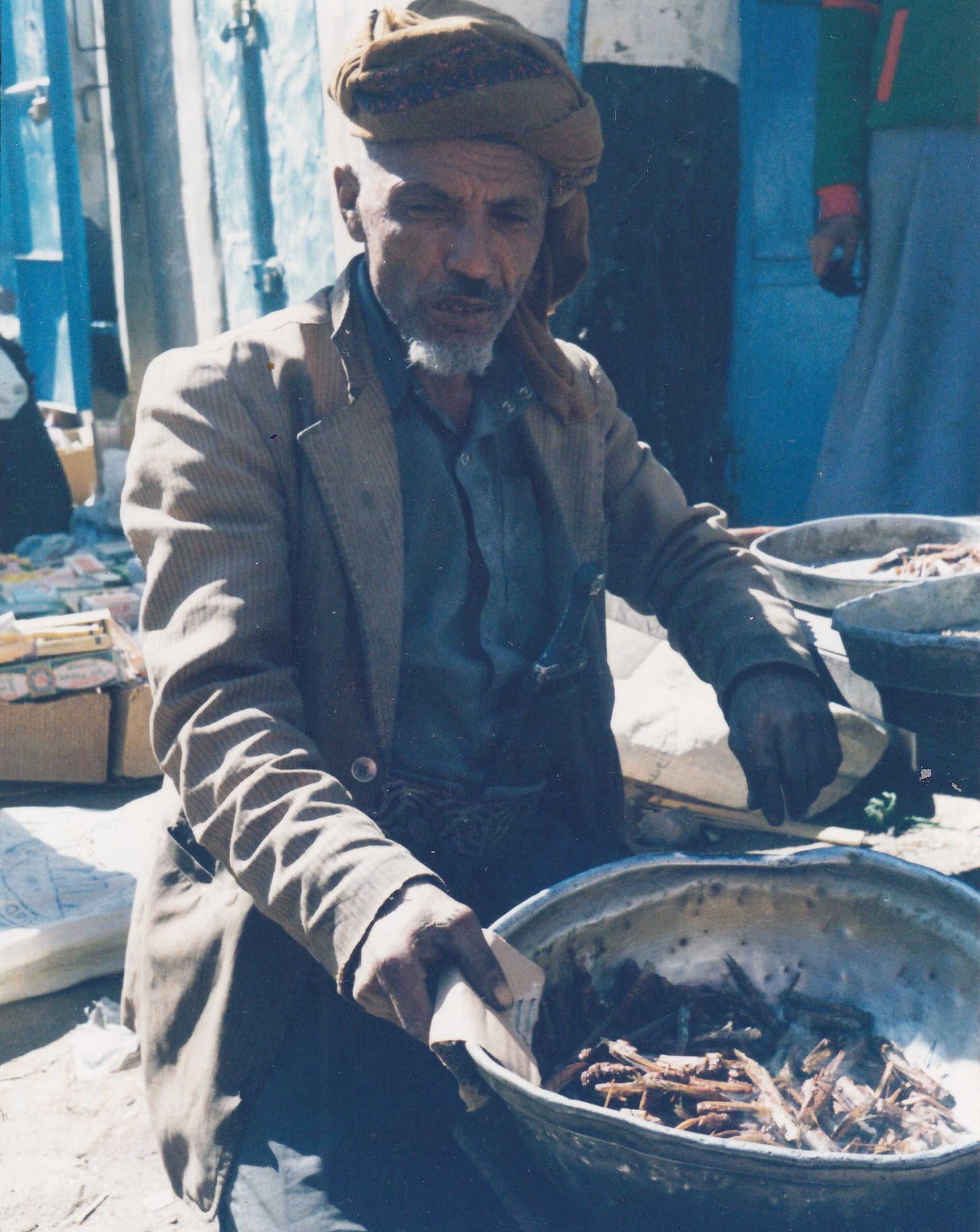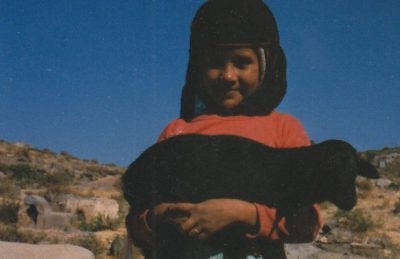A group of US politicians order bombings in Yemen via cell phone. The TV images remind me of my two trips to the architecturally and scenically fascinating country. And of a similar wiretapping scandal in Germany a year ago.
Attack plans - so what?
How it came about that the editor-in-chief of the US magazine Atlantic, Jeffrey Goldberg, got into a chat entitled “Houthi PC Small group” on Signal Messenger on March 15, 2025 without being recognized remains to be clarified. The abbreviation PC stands for “Principals Committee”: leading representatives of the US government's national security discussed imminent military strikes against the Houthis in Yemen in detail. Shortly afterwards, the bombs fall. And the Atlantic publishes the chat posts. The affair is nicknamed “Signal-Gate” after the Watergate scandal in the 1970s. Defense Secretary Pete Hegseth, one of those involved, is now under fire again for allegedly sharing confidential messages with his wife, brother and lawyer in another group chat. According to National Public Radio, NPR, the Trump administration is already looking for a successor.
What the US media are hotly debating in both cases: Were the contents of the chatter “classified” or not? Did those involved endanger national security? Democrats are - of course - calling for resignations. German media join in the bashing of those involved - and fail to mention that a similar debacle came to light in Germany just over a year ago: on February 19, 2024, Air Force Inspector Ingo Gerhartz, Brigadier General Frank Gräfe and two other Bundeswehr officers discuss a possible attack on the Crimean bridge with Taurus cruise missiles to be carried out jointly with the Ukrainian military in a Webex conference call. The Russian secret service listens to the conversation and the state broadcaster Russia Today (RT) publishes the audio recording on the internet. The German Defense Minister Boris Pistorius then accuses Russian President Vladimir Putin of an “information war” and a “hybrid attack for disinformation”. Here, as with the current “Signal-gate” in the USA, the main issue is what content would have been better left behind closed doors and whether the platform for the talks was chosen correctly. The leaked attack plans themselves? They were only an issue in new media that are critical of the government.
The Houthis
The Houthis are a Shiite militia supported by Iran. They have been waging a civil war against the Sunni government of Yemen since 2004 and captured the capital Sanaa at the end of 2014. Ten years ago, on March 26, 2015, a military offensive led by Sunni Saudi Arabia began. Saudi Arabia is Yemen's northern neighbor. The military alliance included Egypt. among others, and was or is logistically supported by the USA, France and the United Kingdom. The German government supplied billions of euros worth of armaments to Saudi Arabia. In addition to ground and air attacks, the military alliance also deployed a naval blockade, which, according to the United Nations, resulted in the “worst humanitarian catastrophe of our time”. Almost half of the dead are civilians. According to media reports, the millions of internally displaced persons include more than two million malnourished children.
Since the terrorist attack by Hamas on October 7, 2023 and Israel's counterattacks, the war has escalated. The Houthis regularly bombard merchant ships on the international sea trade route in the Red Sea and have even destroyed buildings in Tel Aviv - according to their own statements, in solidarity with the Palestinians in Gaza. This is why the US and the UK have been bombing Houthi positions in Yemen as well as targets in the capital Sanaa and in the provinces for more than a year. This was also the case on March 15, 2025, the day of the leaked Signal chat with the attack plans. “Why are they only discussing these plans after the decision has already been made?” Donald Trump's former National Security Advisor John Bolton criticized to CNN. That alone shows what is going wrong in this government, he said. Apart from that? The attack plans themselves. Everything in order?
“Trump is now at war with Iran”, headlined US journalist Ken Klippenstein on his Substack blog on March 18, three days after “Signal-Gate”. The former editor of the online medium The Intercept and ex-correspondent for the weekly newspaper The Nation is convinced that the latest US attacks on the Houthis are not just a continuation of the policy of the previous Joe Biden administration. On February 28, the US military announced that two heavy B-52 bombers had dropped bombs from an “undisclosed location” in the Middle East (Klippenstein claims it was Qatar) on another “undisclosed location” (Iraq). The rulers in the neighboring Islamic Republic of Iran interpreted this as a very clear message to themselves, he adds. In a second “bomber demonstration” on March 9, US B-52s flew long-range missions alongside Israeli fighter jets and practiced joint operations. “Again, the American press missed the story,” writes Klippenstein, but not the Israeli press. It correctly reported the true purpose of the operation - “to prepare the Israeli military for a possible joint strike with the US against Iran”. Even if according to the New York Times Israel's plans in this regard have been rejected by the Trump administration in favor of negotiations, an attack scenario is far from off the table.
So are the US attacks against the Houthis mock battles? A threatening backdrop for Iran? And is Yemen therefore merely the scene of a proxy war? It surely doesn’t make a difference to the civilian victims. For them, every bombing is disastrous. In the leaked Signal chat, one participant writes after the first missiles: “The first target - their [Houthi] top missile guy - we had positive ID of him walking into his girlfriend's building and it's now collapsed.” It is highly likely that the target's girlfriend also died under the rubble. Collateral damage, according to the vocabulary of war.
Yemen in days gone by
I am reminded of a girl I met on a hike in the mountains on my first trip to Yemen. Her name has long since slipped my mind, but I still remember her bushy black eyebrows. The picture I was allowed to take of her also helps my memory. I read the date stamped on the back: September 1989.
At that time, our two countries were still divided by an internal border. Germany was divided into West and East, Yemen into North and South. And one part of each country was ruled by socialists: the east in Germany and the south in Yemen. Shortly after the fall of the Berlin Wall in November 1989, the two Yemeni states united on May 22, 1990 to form the state we know today. On my second trip to Yemen, I was therefore also able to visit Aden, once the capital of the southern People's Democratic Republic of Yemen. The port city is located 125 miles west of the strait Bab al-Mandab (Gate of tears), that separates the Gulf of Aden from the Red Sea. On the other side of this strait lies Somalia. A “failed state” in which the Islamist Shabab are tyrannizing the population. Scores of people therefore venture across the strait to Yemen in windy boats. In Aden, I was able to visit a refugee camp [radio report in German] where Somalis who had crossed over were waiting for better times.
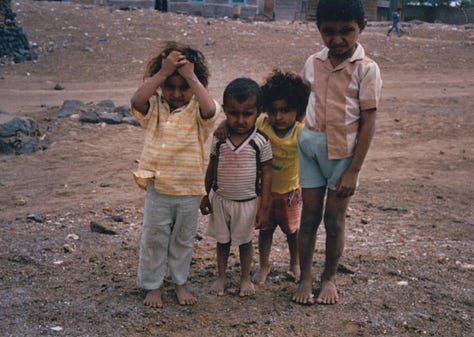

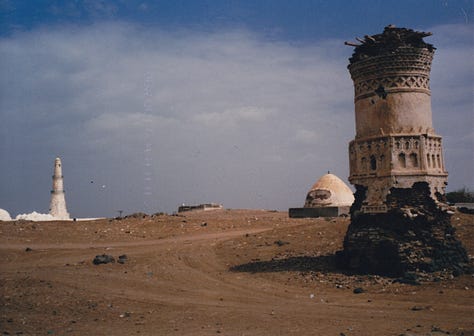

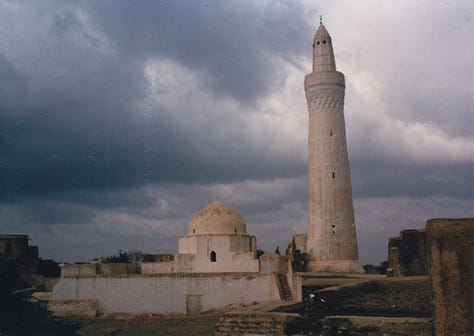
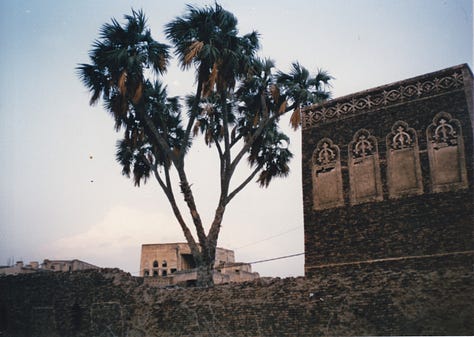
In both the north and the south, the mountains by the sea give way to the flat coast, and towards the south to a subtropical to tropical climate and a less strict dress code (at least at the time of my trip). However, my heart clearly beat for the north of the country, which I explored on my first trip when the country was still divided. I tasted locusts at the market in the then and now capital Sanaa. Unsurprisingly, they tasted like their favorite dish: grass. I bought a beautiful chased ring from a Jewish silversmith and a heavy bracelet that was so big I could wear it on my upper arm. I wonder if there are still Jewish silversmiths in Sanaa now?
My favorite pastime was hiking in the mountains. I rarely met people. I wasn't afraid, because during the years I lived in Cairo I had come to the conclusion that if Muslims are true believers, they won't do me any harm. And at least in the deeply religious but not fanatical Yemen of that time, my experiences proved this conviction right. On my second trip, during a walk along the southern Yemeni coast near Mocha, a group of children and young people threw stones at me. And in Sanaa I had to buy a black shawl to cover my neck, because the one I had brought with me, striped in subtle colors, attracted suspicious and sometimes hostile looks. There was less openness towards strangers. But back then, during my first trip, in the north Yemeni mountains, Ali hospitably invited me into his house when I happened to arrive there on a hike in the mountains. In the pictures you can see the terraced cultivation that has proved successful on the steep mountain slopes. Ali and his brothers carried the traditional curved dagger in their belts. They invited me to have tea in their living room, which was covered with woven carpets, where we sat and leaned against thick cushions while Ali proudly presented his youngest son. At the end, I was even allowed to smoke the shisha, the water pipe, with the women of the house.
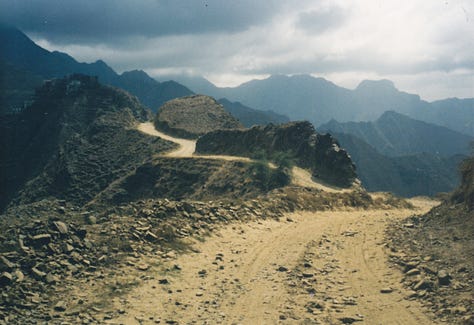

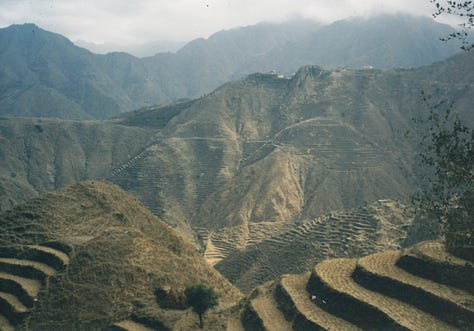



The typical houses of North Yemen are unforgettable, perched majestically on even the steepest hilltops and cliffs.
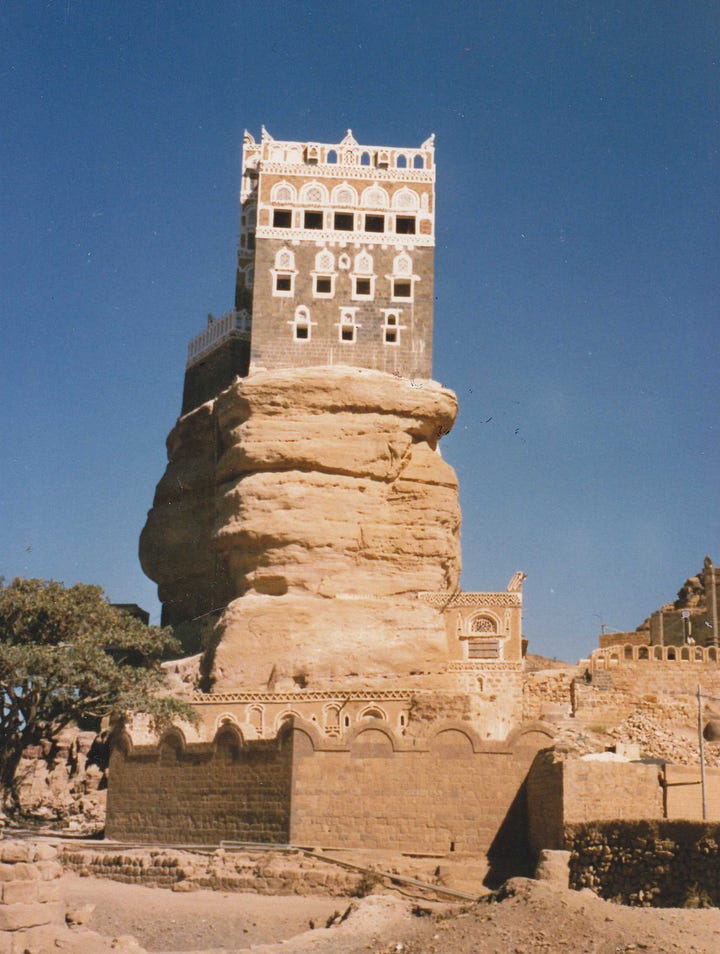
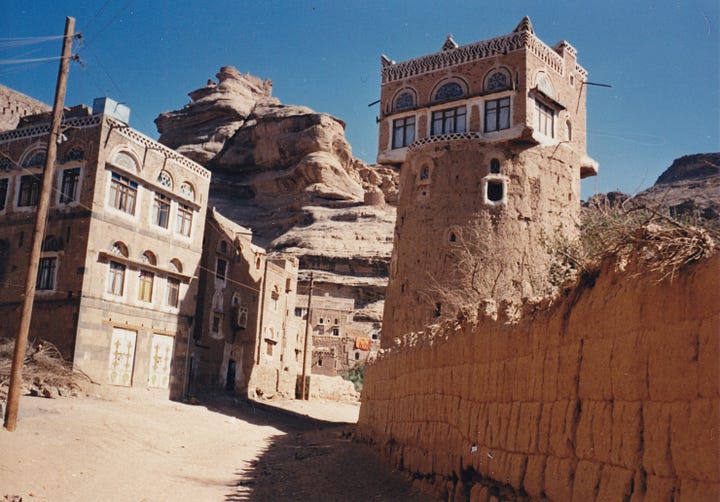
Riding along the narrow mountain roads in rickety old buses or disused jeeps required nerves of steel. When I saw a driver's fat cheek, I took a deep breath. Because that meant that the man was chewing a ball of Kath leaves and, salivating in his cheek, letting it work on his mind while he maneuvered the already decrepit vehicle with us passengers in it along the steep mountain slopes. Kath is a native bush whose twig tips and young leaves, when chewed, stimulate like coffee and reduce the feeling of hunger. Chewed in large quantities and for a long time, Kath has the effect of an intoxicating drug. As we rocked along a dirt road and I looked down through the window into the depths of a valley, I encouraged myself by thinking that the driver had grown so old after all.. and wanted to get even older. Just like me.
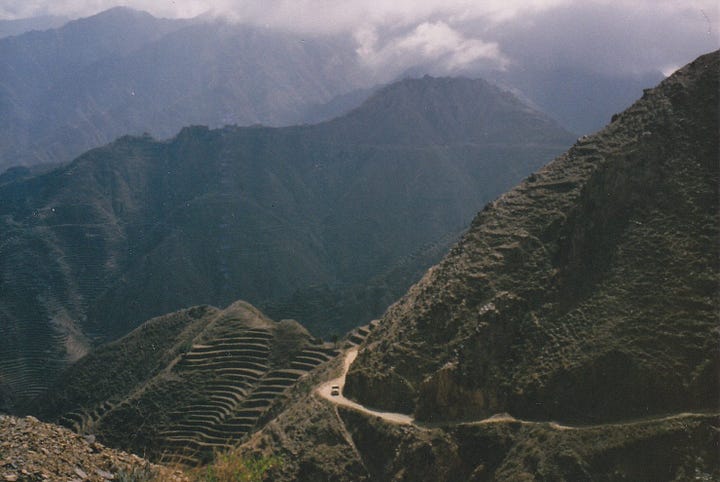
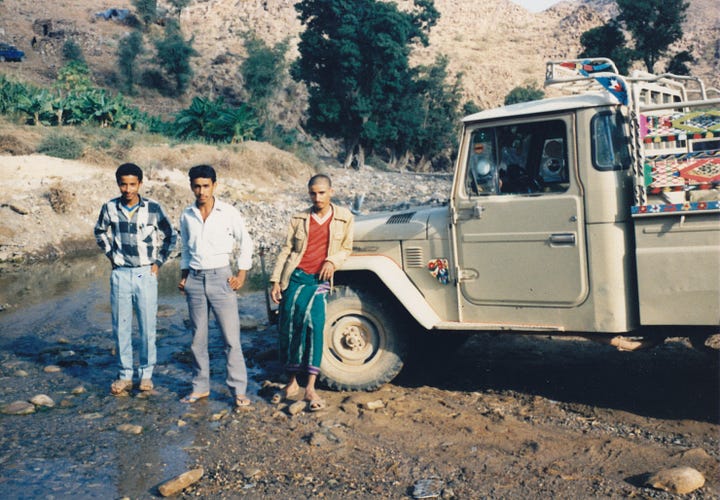
In a hostel somewhere in the countryside, I ate the best “ful” (bean) breakfast of my life, with tomatoes and onions and still-warm flatbread. I met two shepherd girls with a newborn black lamb and the children of two wives of the same one man.
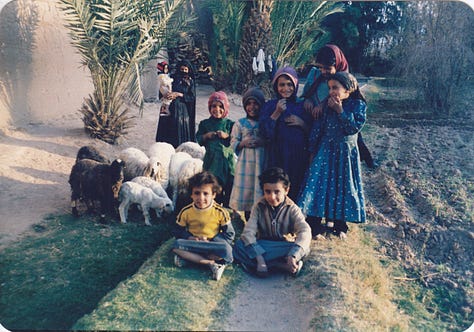
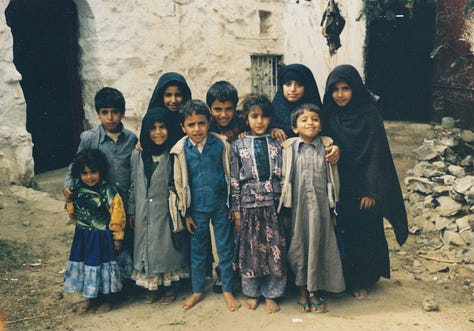
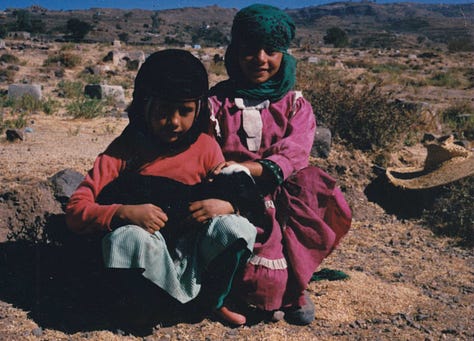
Memories of a country now ravaged by civil war and bombs. For me, my first trip to Yemen remains true to this day: it left me with deeply felt impressions.
This text was first published in German on my website.



